On Thursday, May 19, the Redeemer community gathered at Brix and Columns Vineyards to enjoy the 2022 Logic and Rhetoric Spring Program. In addition to being able to eat and socialize, those in attendance enjoyed the musical and speaking talents of the 6th through 10th graders. The evening began with a welcome from Head of School, Ron Hoch, and then alternated between musical performances and LEAP Presentations.
We commend our students for their amazing performances and our teachers for bringing the very best out of their students.
Mr. Hoch closed out the evening with recognition of retiring teacher and Handbells Director, Kath Wissinger, and then his annual 8th grade commencement remarks.
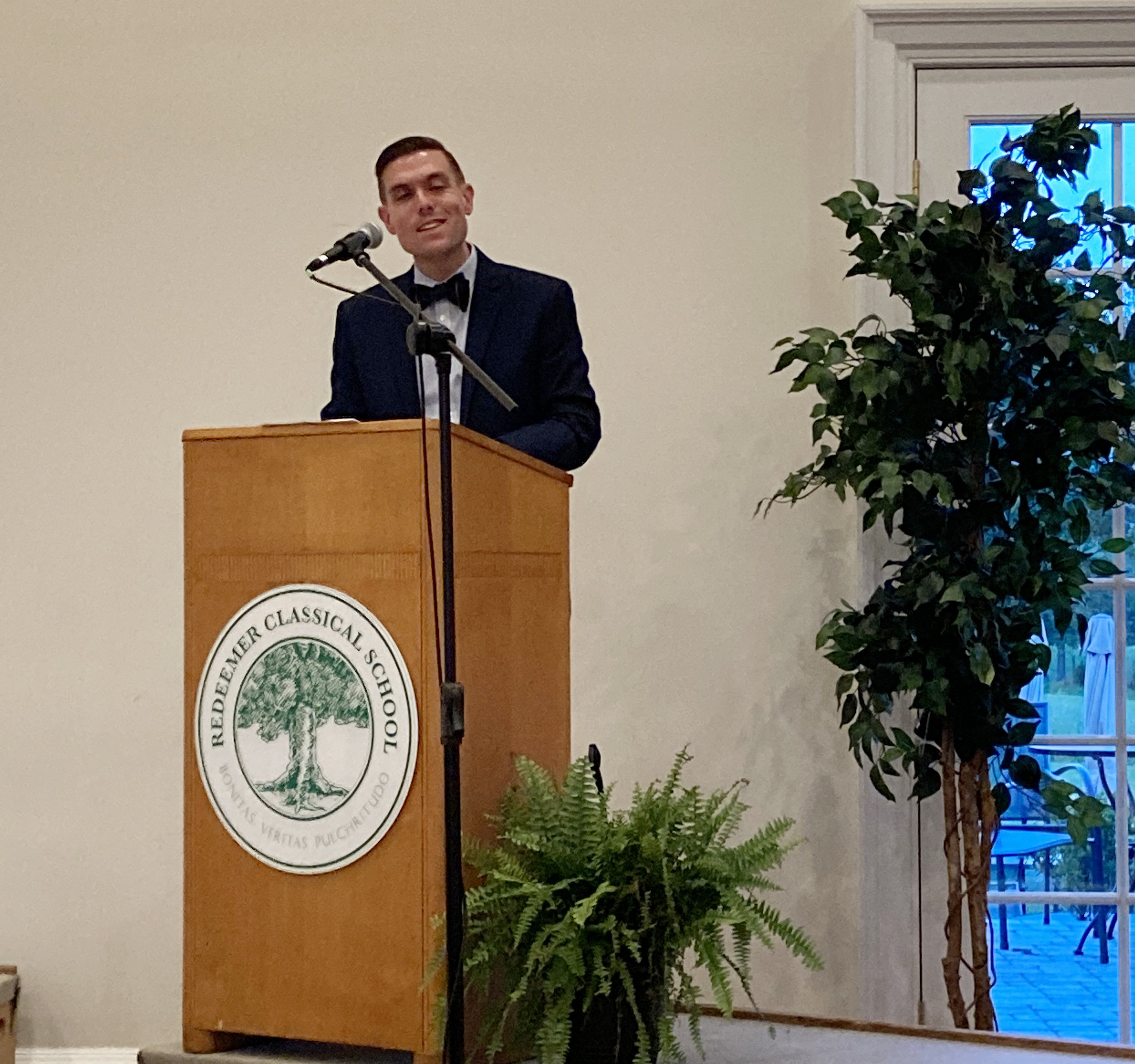
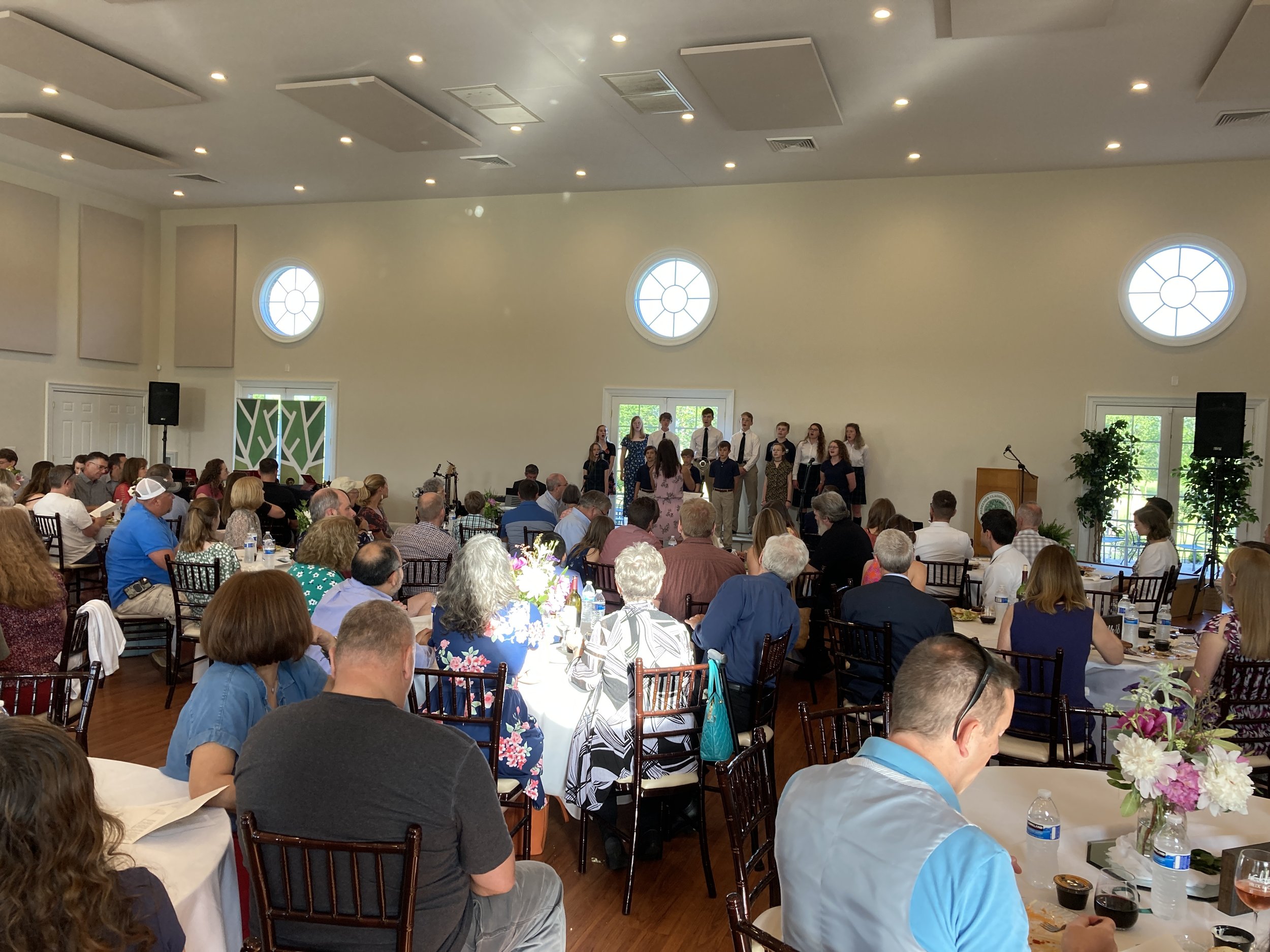
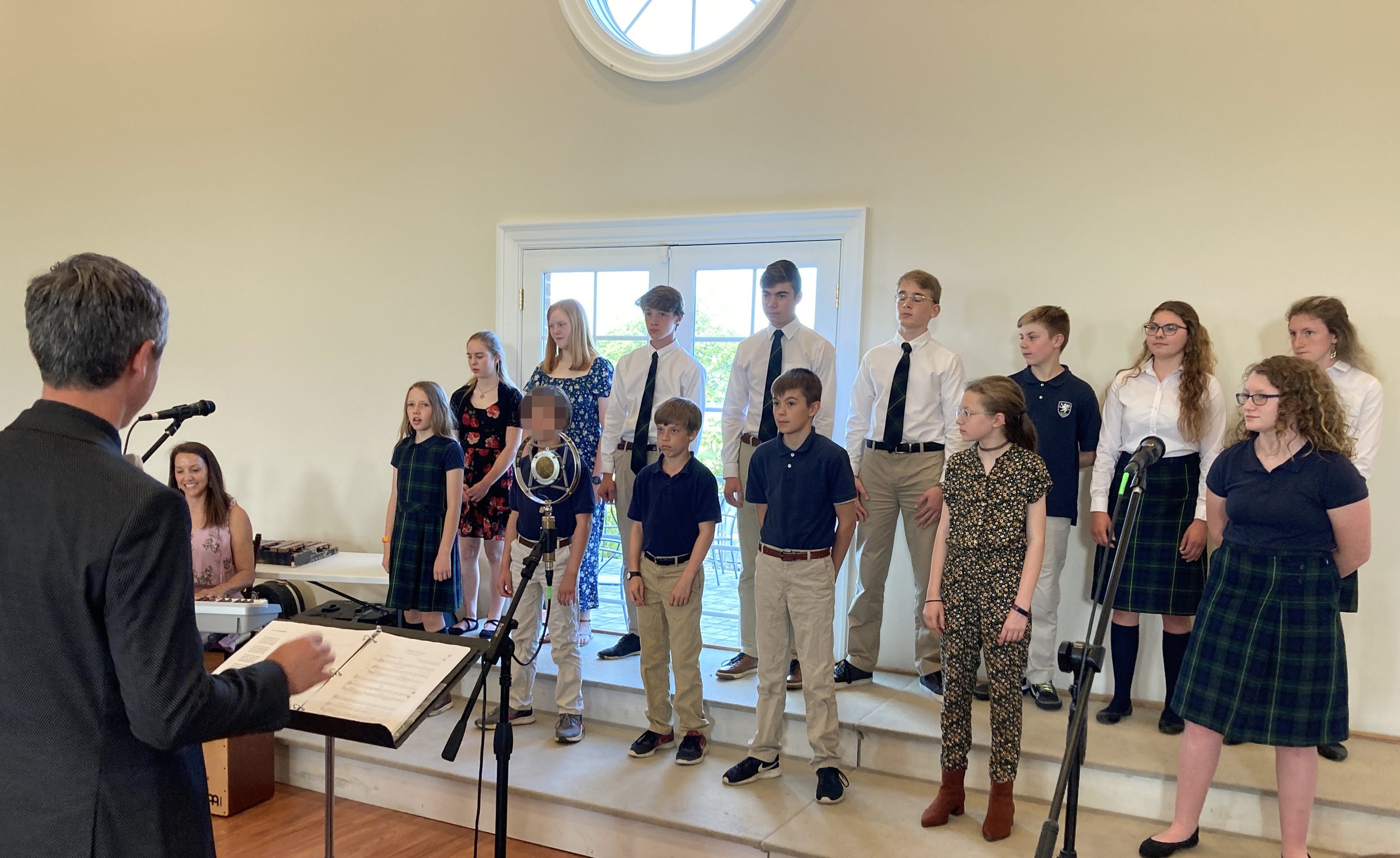
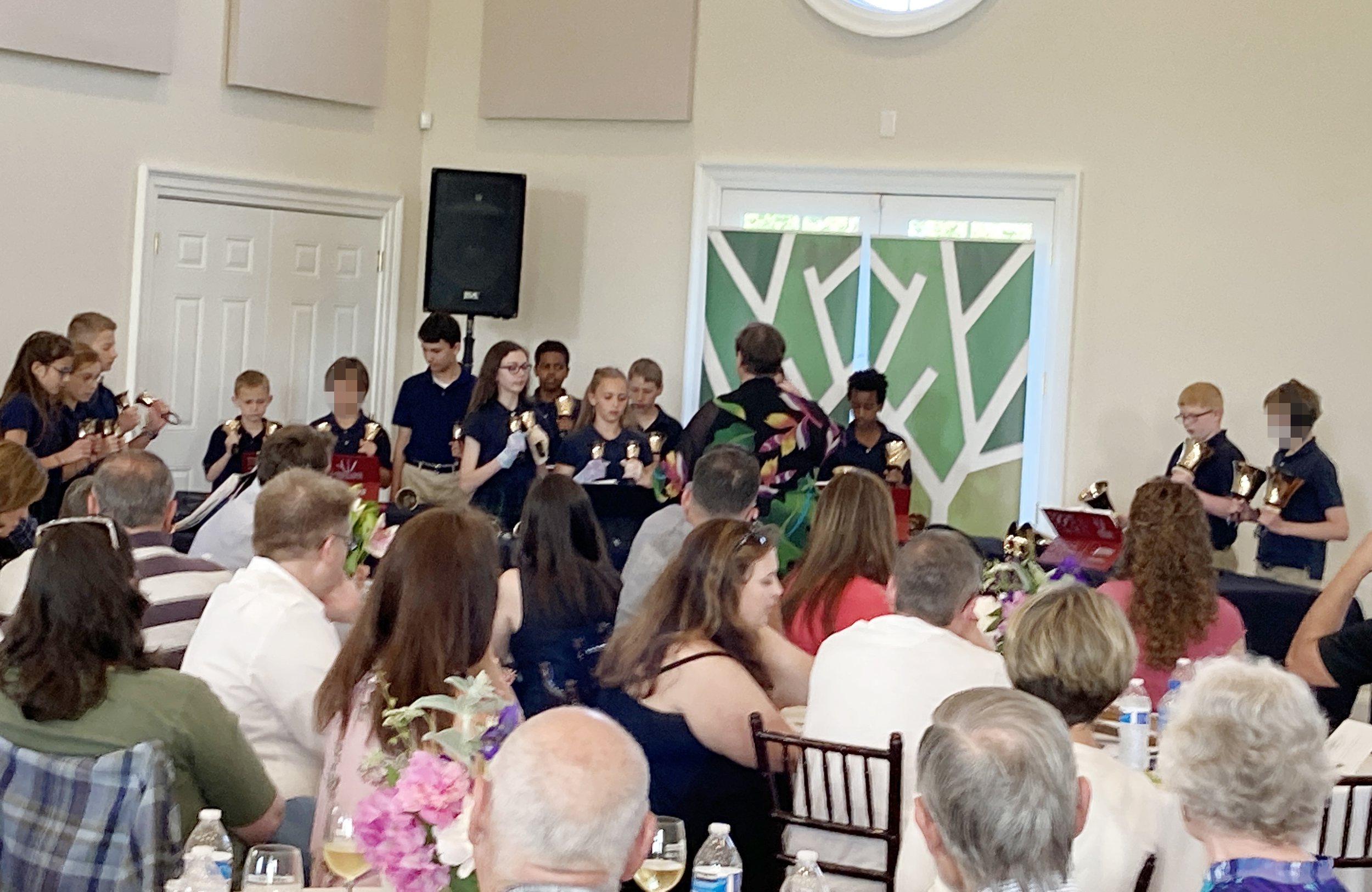
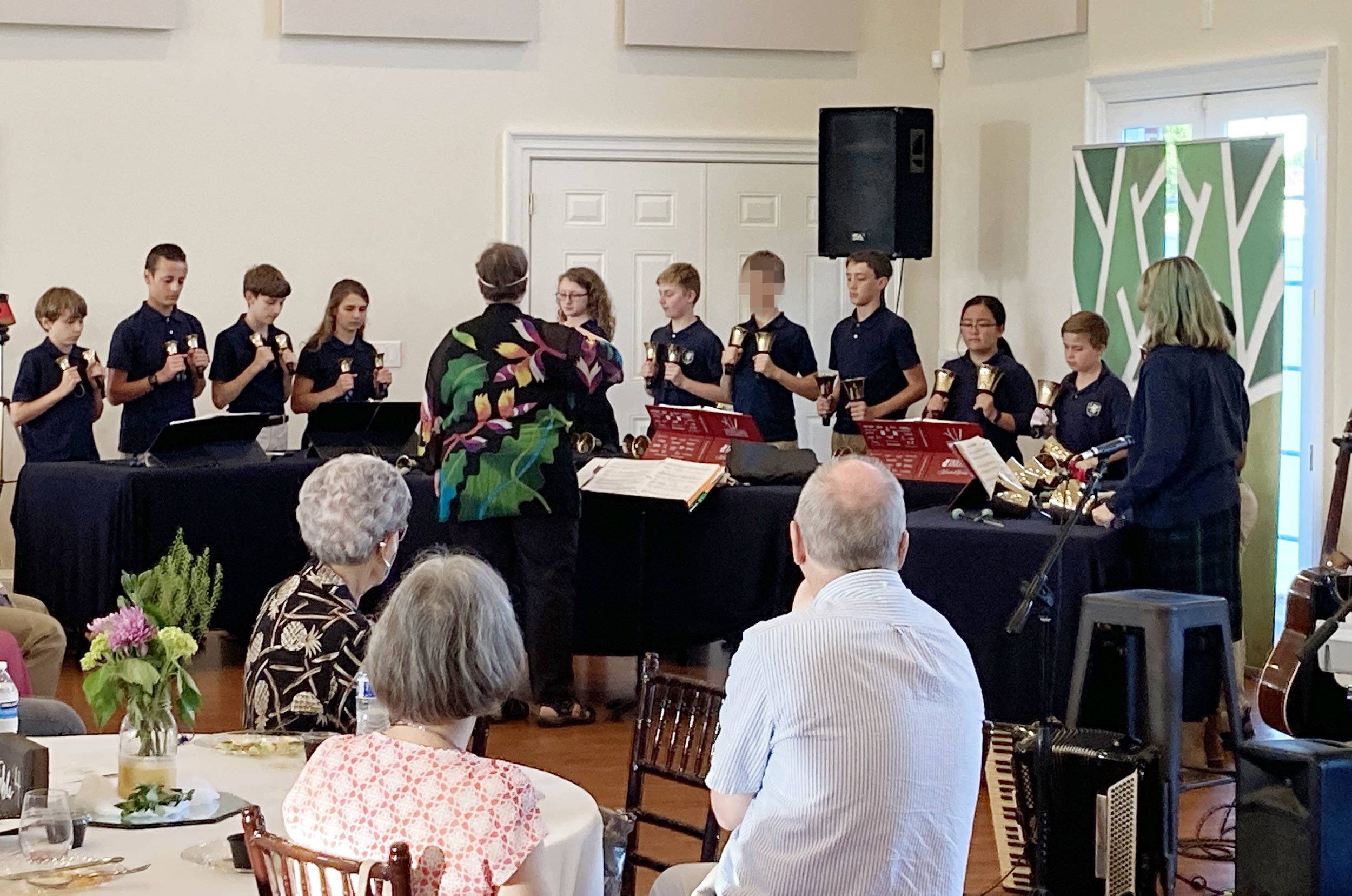
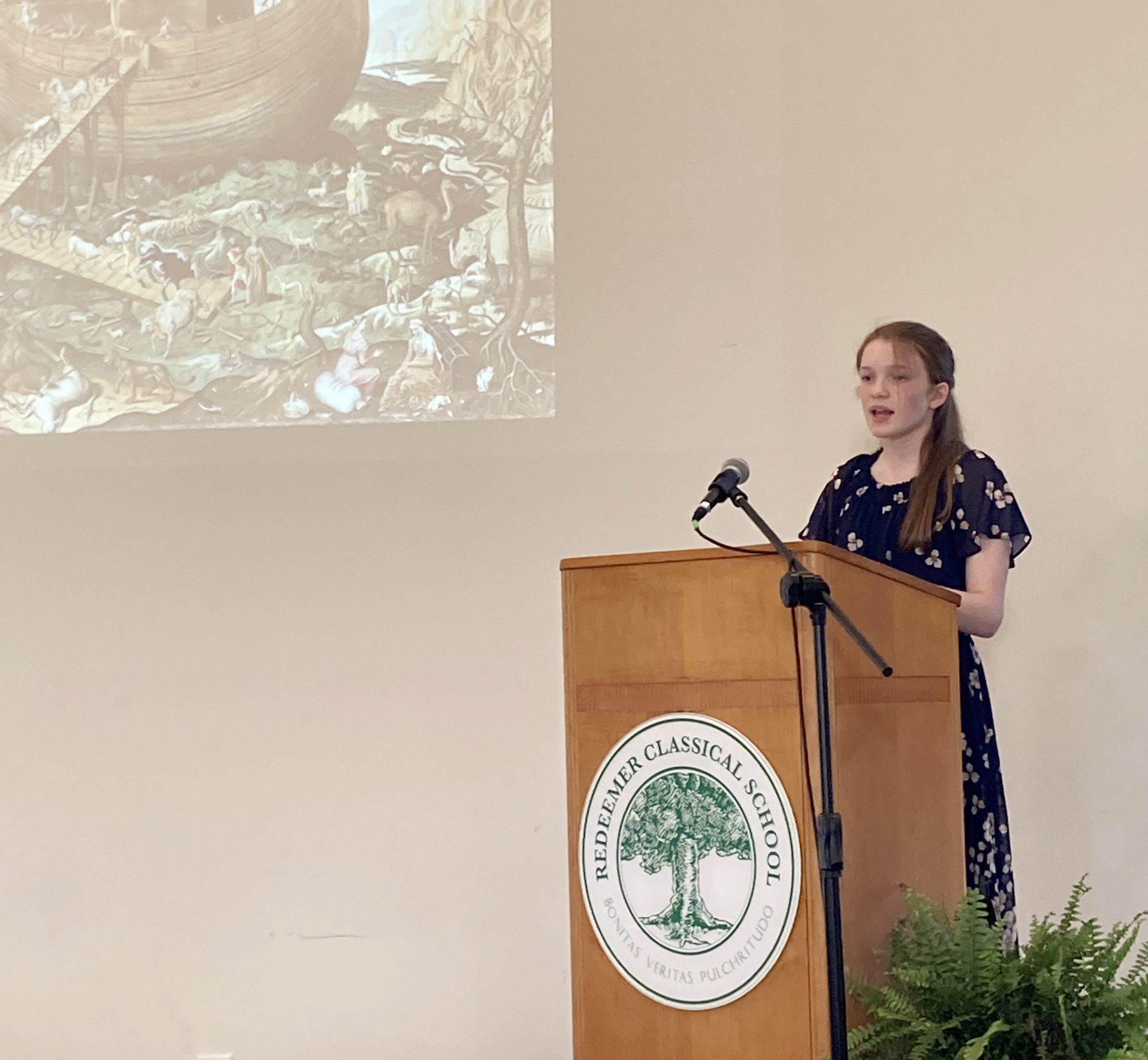
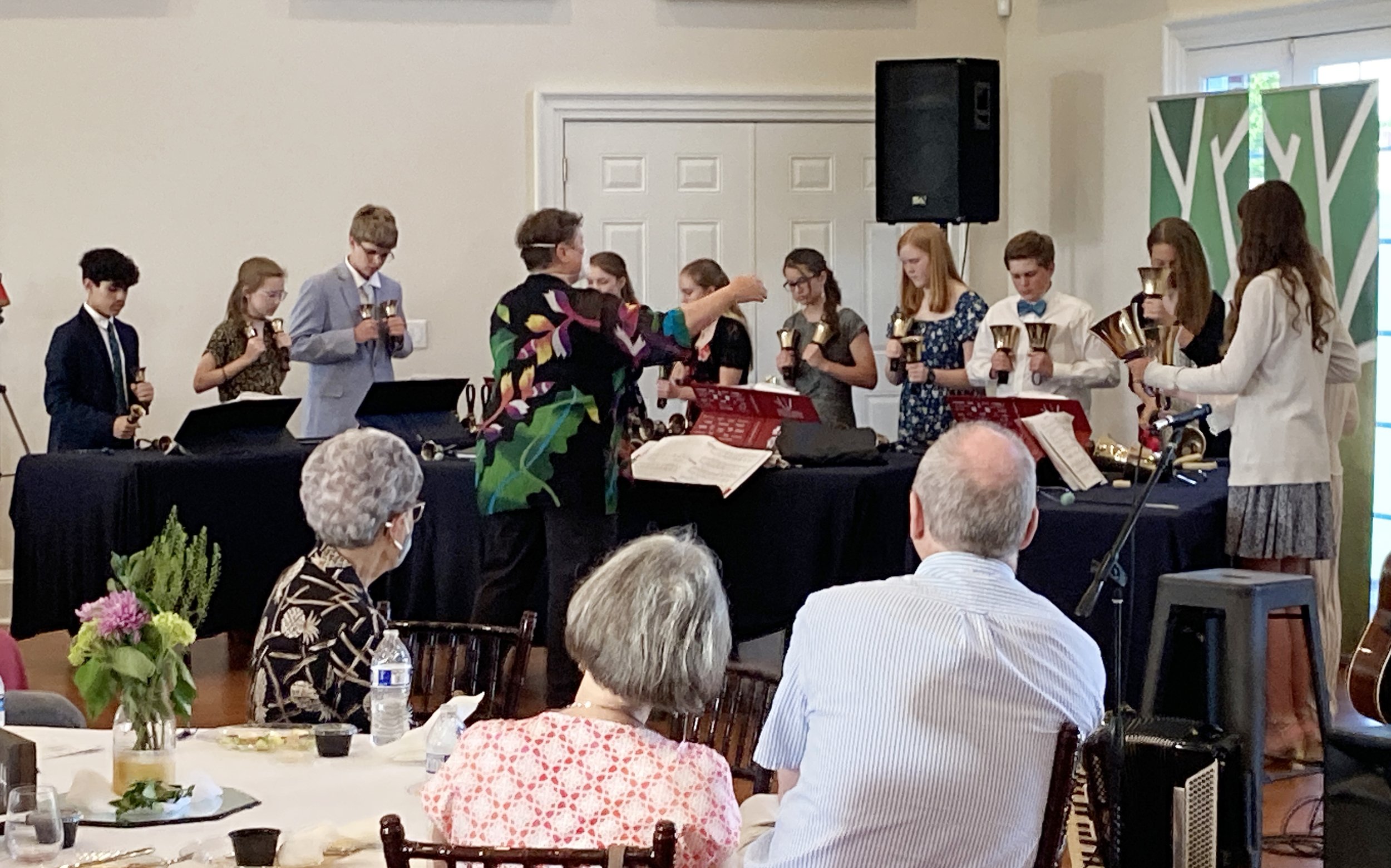
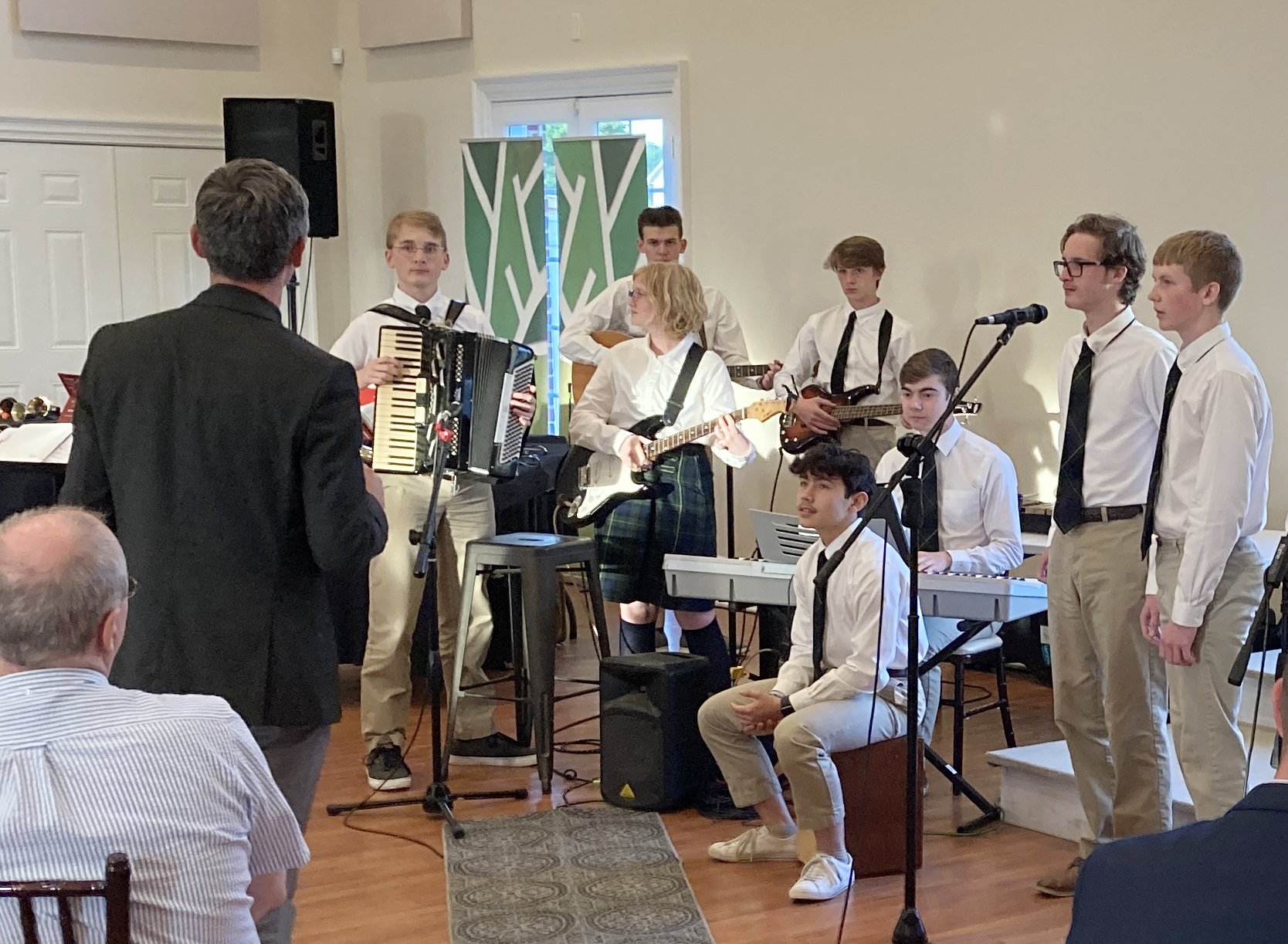
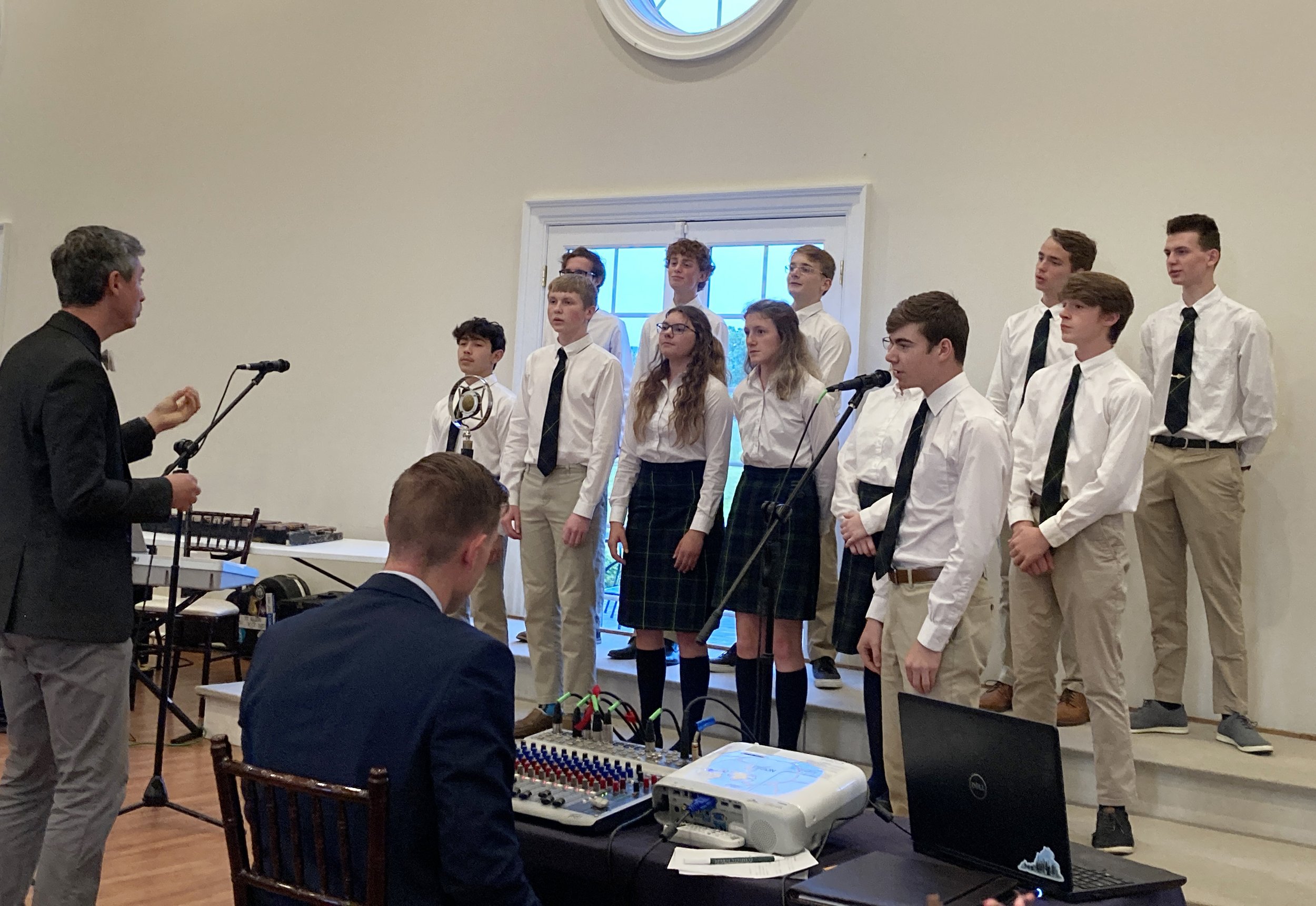
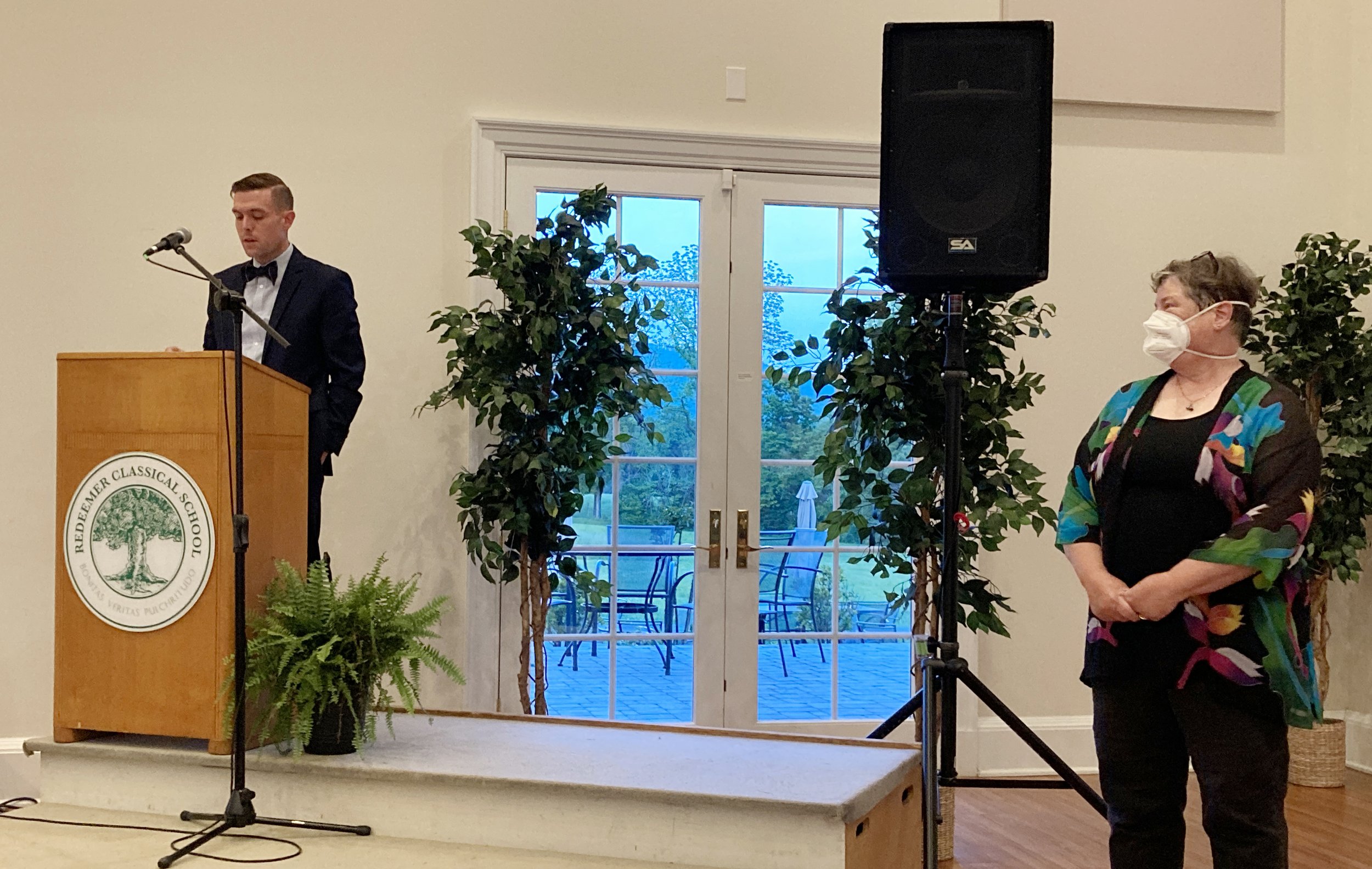
MUSIC
THE REDEEMER CHOIR CLUB
Thula Klizeo, by J. Shabalala, arr. L. Macdonnell
Marvelous, trad., with verses by G. Yoder
6th GRADE HANDBELLS
Dorian Epic, by Kath Wissinger
Lemon Chimes (Cascades), 6th Grade Composition Project
7th GRADE HANDBELLS
Echoes of the Past, by Kath Wissinger
Ghost & Shadow (Bad Hair Day), 7th Grade Composition Project
8th GRADE HANDBELLS
Exodus Dance, by Derek K. Hakes
Desolation (Fear No Evil), 8th Grade Composition Project
9th & 10th GRADE MUSIC
Psalm 139, by RCS class 2025
Psalm 3, by RCS class 2024
Yesterday, by Lennon/McCartney, Latin translation by RCS class of 2025
Swing Down, Chariot, traditional spiritual, arr. Andre J. Thomas
Go Ye Now in Peace, by Joyce Eilers
LEAP PRESENTATIONS
Each year, we challenge our 8th graders to reflect on their time at Redeemer as they prepare to advance out of the Logic School. They spend much of their final semester working on these LEAP Presentations (Logic (School) Ending Achievement Project) — writing, presenting, rewriting, practicing and editing some more. Each student picked a topic of personal interest and importance to him/her and considered how their fascination in the subject has been nurtured at Redeemer. Our goal with these presentations is to glorify God through students’ expressions of knowledge in a field in which they are gifted.
Here’s the title of each of the 8th graders’ amazing lectures (in order of appearance):
Riley Scheidt
Glorifying God through Everything We Do
Ava Hughes
The Power of Poetry
Anna Richardson
Learning Latin
Anna Kosalka
Geomythology and the Great Flood
Lillian Carpenter
Human Nature Through Fiction
Matthew Uribe
Isaac Newton and the Law of Universal Gravitation
Rhianna Crider
Studying God through Academics
Effie Eads
Graphic Novels; Unique, yet Underestimated
Jane Peters
The Ten Life-Giving Commandments
Wiley Hormel
Why is it Important to Study History?
Cale Allen
The Truth of the Bible
CLOSING REMARKS
[Transcript of the speech given by Head of School, Ron Hoch]
Recognition of Mrs. Wissinger
At the end of this school year our long-time handbells teacher and director, Kath Wissinger, will be retiring. Mrs. Wissinger joined the Redeemer Classical School faculty in 2004, that means she’s been with the school since its founding. For 18 years she has faithfully taught and mentored students at Redeemer. Through handbells, she has nurtured both a great facility with and a love for music. At the same time she has encouraged them to work together as a team, to serve others in the community, and to express their musical creativity to the honor and glory of God. Mrs. Wissinger is, indeed, leaving big shoes to fill, and she will be sorely missed.
As an expression of our gratitude and appreciation, we have purchased a special gift for her that will be coming soon. In the meantime, Mrs. Wissinger, on behalf of the entire Redeemer Classical School community, congratulations on your retirement and thank you for your impact!
Commencement Address
It is now my honor to address the 8th grade students directly. I’d like to start with what has become a sort of tradition: sharing a word that I feel describes each of these students well. I don’t do this to pigeon-hole them, or to suggest in any way that this is the sum total of their character. Far from it. But, having had the joy of teaching these students, I want to celebrate some of their best traits and give everyone here a better sense for this wonderful group of people.
Cale Allen: Witty
Lillian Carpenter: Observant
Rhianna Crider: Hard-working
Effie Eads: Inquisitive
Wiley Hormel: Thoughtful
Ava Hughes: Precise
Anna Kosalka: Compassionate
Jane Peters: Faithful
Anna Richardson: Diligent
Riley Scheidt: Caring
Matthew Uribe : Astute
----------------------
The transition from 8th grade into 9th grade provides us with a wonderful opportunity to pause and consider the purpose of education. This is in part to help make sense out of what you’ve been given up to this point, and in part to frame the way you think about the future.
When we discuss the purpose of education today, it is common to focus on the economic impact. That is, we go to school so that we can get a good job, make money, and be self-sustaining. We see this mindset in conversations around the return-on-investment (ROI) of specific college degrees over and against others. Economics is, most certainly, a part of the purpose of education. But it is just a part, and it may very well be the smallest part. We are more than the job we hold, and our value is more than what we contribute to the economy. As such, our interest in education ought to focus on far more than job readiness or giving us skills to get into college so that we can get a good job.
An EDUCATION worthy of our time and energy, should seek to shape who we are, the values we hold, the forms of expression available to us, and our ability to see, understand, and appreciate the world around us. It ought to consider who we are as physical beings, and so promote health and fitness; it ought to consider who we are as thinking beings and so nurture our intellect; it ought to consider the fact that have feelings and so help to regulate our emotions; and it ought to consider who we are as beings created in the image of God and so spur our religious devotion. What’s more, education ought to take into consideration the fact that we live in families, communities, and societies in order to prepare us to be good family members, good friends, and good citizens.
In other words, education ought to prepare us for all of life. It should encompass all of who we are and who we will be, preparing us for the many roles we will take on in this life. To accomplish such a lofty goal, education must provide us the tools to continue learning and growing throughout our lives.
This is the purpose of a liberal arts education, properly understood. Not to prepare us for a moment in time — say a graduation, or a job interview — but to prepare us for every moment in time. In the classical world, the liberal arts of grammar, logic, rhetoric, arithmetic, geometry, astronomy, and music were designed to provide “the essential tools for all subsequent learning” and “to make the acquisition of all later studies more simple and effective.” Viewed this way, the purpose of education is not to get to a point where you no longer have to learn and study, but rather to get you to where you can learn deeper mysteries and more complex ideas with greater ease and enhanced joy.
With all of this in mind, I would like to encourage the 8th grade class with three interrelated pieces of advice as they move into Rhetoric School.
First, recognize that schooling and education are not the same. Psychologist Robin Hogarth makes a distinction between “kind” learning environments and “wicked” learning environments. In kind environments, “patterns repeat over and over, and feedback is extremely accurate and usually very rapid,” whereas in wicked learning environments “the rules of the game are often unclear or incomplete, there may or may not be repetitive patterns and they may or may not be obvious, and feedback is often delayed, inaccurate, or both.”
Schooling is, for the most part, a kind learning environment, and so it prepares us to operate within other kind learning environments. Unfortunately, life is a wicked learning environment. As such, schooling rarely provides us with a sense of what it takes to be a fully formed human being who is capable of facing life’s challenges and opportunities. What we need, instead, is a way of thinking and learning that will prepare us to thrive in the face of difficulty, ambiguity, and change; that will inspire us to love and continually seek truth, goodness, and beauty. This is precisely what a liberal arts education is designed to do. As such, our goal at Redeemer Classical School is not to give you schooling, but to give you a true liberal arts education.
Second, lest my previous point be misunderstood, work hard in school, but for more than a grade. Realign your priorities so that going to school is part of your education, not merely schooling. Know that your value and worth cannot be measured by the grades you receive (or don’t receive) and the degrees that you earn (or don’t earn). Don’t think of the next four years (or 8 years, or 12 years) as something you have to get through before life can begin. Instead, think of them as a unique opportunity to acquire the knowledge and skills that will help fully form you. In other words, strive to do your best in school in order to become an educated person, not simply a schooled person.
Third, and finally, I encourage you to stay curious. Not just in ninth grade, or throughout Rhetoric school, or into college. But stay curious throughout your life. Never stop learning, growing, and improving. When you think to yourself, “How does X work?” or “Why does this happen when I do Y” or “There’s got to be a better way at doing Z!” Don’t be content to let that thought slip away. Instead, investigate, explore, innovate, try and fail and then try again. Strive to grow your sense of wonder with the created order and the God who created and sustains it. Revel in the joy of making new discoveries and learning new things. See the beauty around you with a fresh perspective each and every day. Furthermore, as you cultivate your curiosity, turn back to God in worshipful praise for his goodness, grace, and mercy. For he has given us an incredible world to explore and he has given us minds capable of exploring it — and that is an immense blessing!
So, whether you are continuing on into the Rhetoric School at Redeemer or moving on to another school, remember that schooling and education are not the same; work hard in school for something more than a grade; and stay curious.
Congratulations on finishing Logic School well, and for doing a fantastic job with your LEAP presentations. Now, onward and upward!
